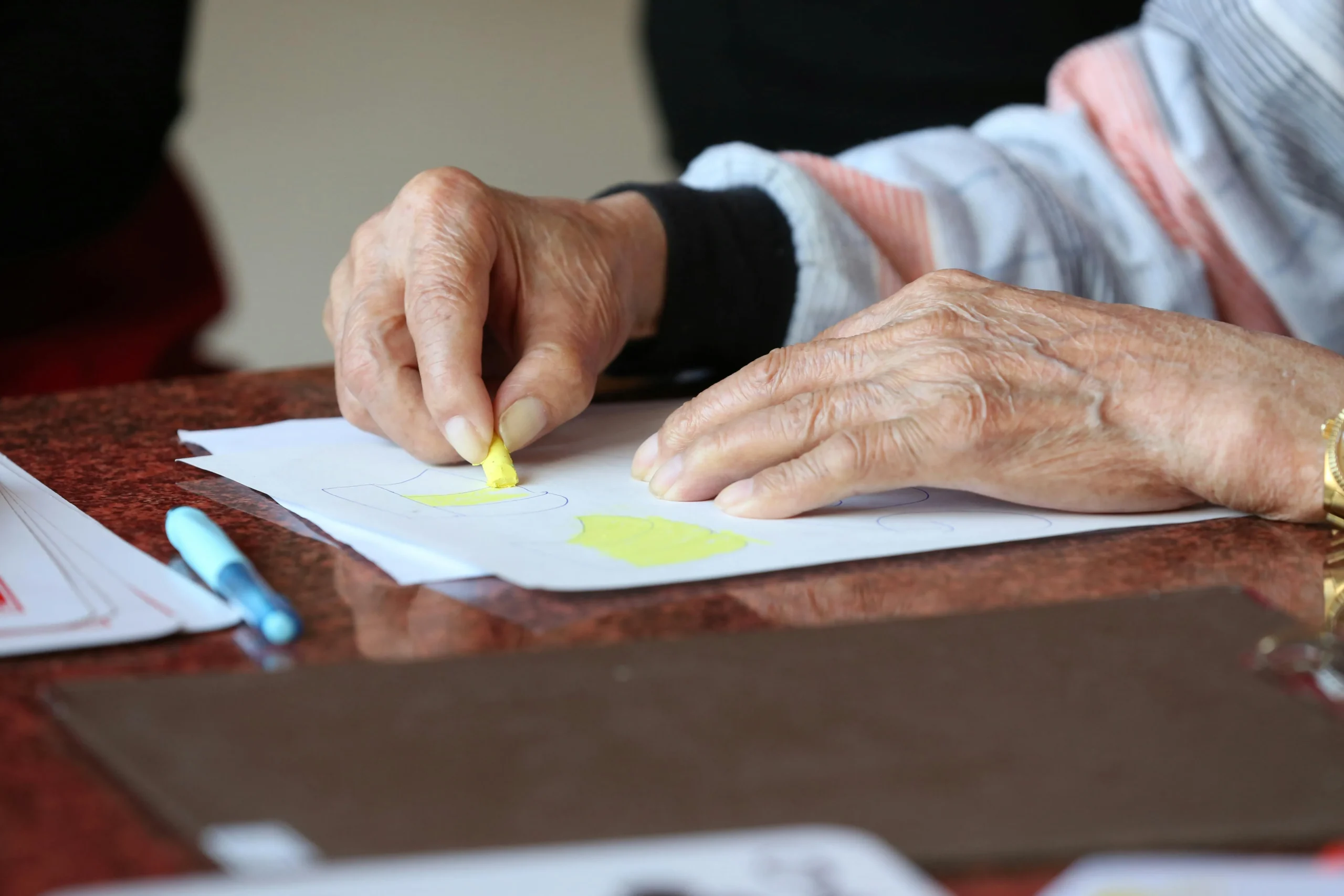According to the WHO, there are more than 55 million people who have dementia worldwide, with millions more cases expected as the population ages. But there’s a lot of confusion about the difference between dementia vs. Alzheimer’s. The truth is, Alzheimer’s is just one type of dementia, not the other way around. Understanding the specific kind of dementia someone has lets families get the proper care and support.
This article breaks down the essential differences between dementia vs. Alzheimer’s to help families spot symptoms sooner and know what to expect.
Understanding Dementia

Before we delve into dementia vs. Alzheimer’s, we must first address a common misconception: Alzheimer’s, though a major type of dementia, is just one piece of the puzzle. Dementia, on the other hand, is the umbrella term covering various cognitive disorders affecting memory, thinking, and daily activities.
Types of Dementia
Now that we’ve touched on the basics of dementia vs. Alzheimer’s, let’s look at different types of dementia, each with its own set of characteristics and challenges:
Alzheimer’s Disease: The most common type of dementia. It happens when proteins in the brain tangle. This process messes with memory and thinking and worsens over time. Many will even lose their physical abilities at the end of the disease.
Vascular Dementia: This condition is caused by problems with blood flow to the brain. Often, it’s linked to strokes or other issues with blood vessels. How much it affects thinking depends on where and how much the blood flow is affected.
Lewy Body Dementia: It’s a mix of Alzheimer’s and Parkinson’s features that happens when a clump of proteins called Lewy bodies (hence the name) cause ups and downs in how alert you are, sometimes leading to seeing things that aren’t there, and causing issues with moving around.
Frontotemporal Dementia: Frontotemporal Dementia is like a change in who the person is. It messes with the front and side parts of the brain, affecting behavior, personality, and speech. This one often appears earlier in life compared to other kinds of dementia.
Mixed Dementia: Mixed Dementia is like having a mix of different things going on in the brain at the same time. Imagine having both Alzheimer’s and vascular dementia together. It makes things complicated because someone with such a type of dementia has to deal with different challenges of each kind at once.
General Symptoms of Dementia
Dementia symptoms aren’t the same for everyone. What starts as forgetfulness can slowly become more severe over months and years. However, knowing what to expect can make the journey a little easier. Some common symptoms to look out for include:
- Memory Loss: Difficulty remembering familiar words, recent events, or familiar faces.
- Challenges in Tasks: Struggling with everyday simple tasks, such as handling money or paying the bills. At a later stage, even getting dressed can also be a problem.
- Confusion: Feeling disoriented about time and place leads to getting lost or missing out on an appointment.
- Communication Issues: Difficulty expressing thoughts and following conversations.
- Mood and Personality Changes: Changes in mood, including increased anxiety, irritability, or withdrawal.
Remember, these symptoms can differ from person to person and tend to worsen over time, emphasizing the importance of early recognition and support for those navigating the complexities of dementia.
Understanding Alzheimer’s Disease

Alzheimer’s is a brain disease that causes problems with memory, thinking, and behavior. It happens when abnormal protein clumps build up in the brain and block communication between nerve cells. Over time, Alzheimer’s destroys brain cells and shrinks the size of the brain. As the damage progresses, people have more trouble solving problems, communicating, and carrying out simple daily tasks.
Stages of Alzheimer’s
Alzheimer’s tends to change slowly in three main stages, below:
Early stage: In the beginning, the signs of Alzheimer’s can be subtle – like someone having trouble finding the right words or forgetting where they put their keys. They start misplacing things more or struggle to remember names. These minor memory lapses may come and go at first. However, they show the early changes happening in the brain that signal Alzheimer’s disease.
Middle stage: This stage usually lasts the longest. As Alzheimer’s progresses to the middle stage, the person’s confusion worsens. Even familiar places become confusing. They might ask the same questions repeatedly or need more help with daily tasks.
Late Stage: The late stage of Alzheimer’s is very tough. Communication becomes highly challenging as the disease advances. Some may be bedridden, unaware of their surroundings or loved ones. Many people even reach a point where they cannot care for themselves at all – needing full-time Alzheimer’s care for eating, dressing, walking, and more.

Alzheimer’s Risk Factors
What puts someone at risk for Alzheimer’s disease? The National Institute on Aging points to a few key factors:
- Age: Getting older is the most significant risk. Most people with Alzheimer’s are diagnosed after age 65.
- Family History: Having a parent or sibling with Alzheimer’s increases someone’s risk. Specific genes also play a role.
- Head Injuries: Previous severe head trauma appears linked to higher risk.
- Lifestyle: Heart health, education level, and staying socially engaged may help reduce risk.
Dementia vs. Alzheimer’s: Key Differences
Causes and Conditions
To differentiate dementia vs. Alzheimer’s, it’s crucial to know that dementia isn’t a specific disease but rather a collective term for conditions like Alzheimer’s, vascular dementia, and Lewy body dementia. The critical difference is what causes the brain to change. In Alzheimer’s, plaque and tangles build up in the brain over time. But with other dementias, issues like stroke, Lewy bodies, or something else damages the brain.
Symptoms and Diagnosis
When looking at dementia vs. Alzheimer’s, it is important to notice that the early symptoms can look similar – forgetfulness, confusion, and getting lost. But Alzheimer’s tends to get worse in a more predictable pattern. Unfortunately, there isn’t a single test available to differentiate dementia vs. Alzheimer’s. Doctors need to assess cognitive skills, run tests like CT or MRI scans, and look at family history.
However, early recognition by family or caregivers is essential to initiate the diagnostic procedure, as early diagnosis provides families with more time to plan care, seek resources, and improve the overall quality of life for their loved ones affected by these conditions.
Treatment and Management of Dementia vs. Alzheimer’s
While there is no cure yet for most dementias, including Alzheimer’s, several options help manage symptoms. Medications can temporarily ease cognitive decline and behavior changes. Keeping the brain active with puzzles or learning new skills, exercising, having healthy eating habits, socializing, and getting enough sleep may also slow the progression.
But the most essential way of managing this condition is through compassionate care and support from family, friends, or professional caregivers. Whether providing comfort, engagement, or help with daily living, in-home care focused on individual needs improves the quality of life. Research continues for more treatments, but thoughtful care now allows many to live meaningfully with dementia for years.
End Note
To simply state the difference of dementia vs. Alzheimer’s: Alzheimer’s is dementia, but not all dementia is Alzheimer’s. But the most important thing is that no one has to face it alone. Even without a cure yet, focusing on comfort and quality time together makes a big difference. Researchers keep working on better diagnostic tools and treatments. But in the meantime, thoughtful care and family support matter most.
If you notice changes in the memory or thinking of your loved ones, contact Sunny Days Great Lakes for help. Our team of professionals is here to provide personalized care plans and resources to make daily life a little brighter. With compassionate support focused on what matters to your family, you can enjoy meaningful moments and make new memories even through the toughest days.
